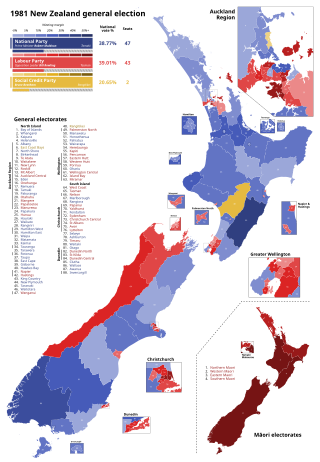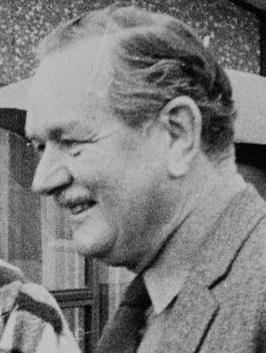
Sir Robert David Muldoon was a New Zealand conservative politician who served as the 31st prime minister of New Zealand, from 1975 to 1984, while leader of the National Party. Departing from National Party convention, Muldoon was a right-wing populist and economic nationalist, with a distinctive public persona described as reactionary, aggressive, and abrasive.
The New Zealand National Party, shortened to National or the Nats, is a centre-right New Zealand political party that is the current senior ruling party. It is one of two major parties that dominate contemporary New Zealand politics, alongside its traditional rival, the Labour Party.

The New Zealand Social Credit Party was a political party that was New Zealand's third party from the 1950s to the 1980s. It won representation in the New Zealand House of Representatives, holding one seat at times between 1966 and 1981, and two seats from 1981 to 1987. While Social Credit once had significant support, particularly as a protest vote, it was disadvantaged by first-past-the-post voting as it had no geographically concentrated vote. Its most identifiable leaders were Vernon Cracknell (1963-70), who served just one term in parliament, and the household name Bruce Beetham, who rebuilt the party into a significant political force. At its zenith under Beetham in 1981, Social Credit achieved 20.7% of the vote.

The 1984 New Zealand general election was a nationwide vote to determine the composition of the 41st New Zealand Parliament. It marked the beginning of the Fourth Labour Government, with David Lange's Labour Party defeating the long-serving Prime Minister, Robert Muldoon, of the National Party. It was also the last election in which the Social Credit Party won seats as an independent entity. The election was also the only one in which the New Zealand Party, a protest party, played any substantial role.

The 1981 New Zealand general election, held on 28 November 1981, was a nationwide vote to determine the shape of the 40th New Zealand Parliament. It saw the governing National Party, led by Robert Muldoon, win a third term in office, but the opposition Labour Party, led by Bill Rowling, won the largest share of the votes cast.

The 1975 New Zealand general election was held on 29 November to elect MPs to the 38th session of the New Zealand Parliament. It was the first general election in New Zealand where 18- to 20-year-olds and all permanent residents of New Zealand were eligible to vote, although only citizens were able to be elected.
Alan Morton McCulloch is the leader of the small One New Zealand political party in New Zealand, and previously served as president of the party. He was mayor of East Coast Bays from 1974 to 1983, and has also served in a number of roles in North Shore, such as president of Grey Power, and stood as a candidate for the office of mayor of North Shore City.

The 1978 New Zealand general election was a nationwide vote to elect the 39th New Zealand Parliament. It saw the governing National Party, led by Robert Muldoon, retain office, but the opposition Labour Party won the largest share of the vote. Reorganisation of the enrolment system caused major problems with the electoral rolls, which left a legacy of unreliable information about voting levels in this election.

The 39th New Zealand Parliament was a term of the Parliament of New Zealand which began with the general election held on 25 November 1978, and finished with the general election held on 28 November 1981. The dates of the Muldoon Ministry were from 13 December 1978 to 11 December 1981.
The Northern Maori by-election of 1980 was a by-election for the Northern Maori electorate during the 39th New Zealand Parliament. It was prompted on 29 April by the resignation of Matiu Rata, a former member of the Labour Party who was establishing a new group, Mana Motuhake. Rata believed that contesting a by-election would give him a mandate for his change of allegiance. In the end, however, his plan backfired when the seat was won by Bruce Gregory, his replacement as the Labour Party candidate.
The Onehunga by-election of 1980 was a by-election for the Onehunga electorate during the 39th New Zealand Parliament. It was prompted by the death of Frank Rogers, a Labour Party MP. It was held on 7 June 1980 and was won by Fred Gerbic, also of the Labour Party.

East Coast Bays is a New Zealand parliamentary electorate. It was first formed in 1972 and has existed apart from a break lasting two parliamentary terms. The electorate has been held by Erica Stanford of the National Party since the 2017 general election.
Gary Thomas Knapp is a former New Zealand politician of the Social Credit Party.
Neil Joseph Morrison was a New Zealand politician of the Social Credit Party.

Air Commodore Thomas Francis Gill, was a New Zealand air force pilot and politician. He flew with the Royal Air Force throughout the Second World War and afterwards served with the Royal New Zealand Air Force until 1969. He entered Parliament as a National Party MP in 1969 and served as a cabinet minister from 1975 to 1980, when he resigned to become New Zealand's Ambassador to the United States.
Susanne Mary Wood served as the president of the New Zealand National Party from 1982 to 1986, the youngest person and the first woman to hold the post.
Barry Selwyn Gustafson is a New Zealand political scientist and historian, and a leading political biographer. He served for nearly four decades as professor of political studies at the University of Auckland, and as Acting Director of the New Zealand Asia Institute from 2004 to 2006. He has contested various general elections, first for the Labour Party and later for the National Party, coming second each time.

The Tamaki by-election 1992 was a by-election held in the Tāmaki electorate during the 43rd New Zealand Parliament, on 15 February 1992. It was caused by the resignation of incumbent MP Sir Robert Muldoon and was won by Clem Simich with a majority of 1,252. The by-election was also notable as the first contested by the recently formed Alliance Party, and for their success in coming second ahead of the Labour Party.

The Mangere by-election of 1977 was a by-election for the electorate of Mangere on 26 March 1977 during the 38th New Zealand Parliament. The by-election resulted from the resignation of the previous member Colin Moyle after accusations against him in parliament, and he was replaced by David Lange, also of the Labour Party. Apart from Lange, there were seven other candidates in the by-election.

The Northern Maori by-election of 1963 was a by-election for the electorate of Northern Maori on 16 March 1963 during the 33rd New Zealand Parliament. The by-election resulted from the death of the previous member Tapihana Paikea on 7 January 1963. It was held the same day as the Otahuhu by-election.















